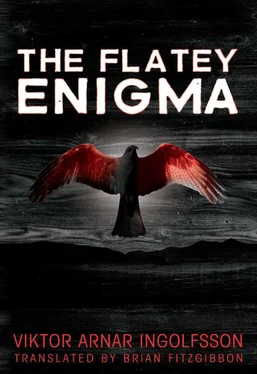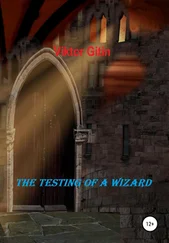Viktor Ingolfsson - The Flatey Enigma
Здесь есть возможность читать онлайн «Viktor Ingolfsson - The Flatey Enigma» весь текст электронной книги совершенно бесплатно (целиком полную версию без сокращений). В некоторых случаях можно слушать аудио, скачать через торрент в формате fb2 и присутствует краткое содержание. Жанр: Триллер, на английском языке. Описание произведения, (предисловие) а так же отзывы посетителей доступны на портале библиотеки ЛибКат.
- Название:The Flatey Enigma
- Автор:
- Жанр:
- Год:неизвестен
- ISBN:нет данных
- Рейтинг книги:5 / 5. Голосов: 1
-
Избранное:Добавить в избранное
- Отзывы:
-
Ваша оценка:
- 100
- 1
- 2
- 3
- 4
- 5
The Flatey Enigma: краткое содержание, описание и аннотация
Предлагаем к чтению аннотацию, описание, краткое содержание или предисловие (зависит от того, что написал сам автор книги «The Flatey Enigma»). Если вы не нашли необходимую информацию о книге — напишите в комментариях, мы постараемся отыскать её.
The Flatey Enigma — читать онлайн бесплатно полную книгу (весь текст) целиком
Ниже представлен текст книги, разбитый по страницам. Система сохранения места последней прочитанной страницы, позволяет с удобством читать онлайн бесплатно книгу «The Flatey Enigma», без необходимости каждый раз заново искать на чём Вы остановились. Поставьте закладку, и сможете в любой момент перейти на страницу, на которой закончили чтение.
Интервал:
Закладка:
“The only possibility then would be to use the van from the fish factory, but it hasn’t been started yet this spring. Krakur’s cart is perfectly adequate,” Grimur answered.
The deacon tilted on his toes again and said, “Yes, my cart is always used by the church for funerals here on Flatey.”
“Very well,” said Kjartan. “Thank you for taking care of that.”
Grimur wavered impatiently. “My wife, Imba, is ready with the lunch,” he said. “Let’s not keep her waiting.”
They walked across the village with Thormodur Krakur leading the way. Shouldering his walking stick like a rifle, he swung his other arm to the beat of a military march. Women were tending to their clotheslines in front of several houses and curiously observed the men as they walked by. Thormodur Krakur outlined the lay of the land for Kjartan in a lofty voice and pointed with his free hand: “That’s the warehouse over there, and there’s the telephone exchange, and there’s the co-operative store,” he announced, “and this is where our blessed priest lives, Reverend Hannes, and that’s Gudjon’s boy there tentering the seal fur.”
They walked past three furs that had been stretched on the gable with the furry side facing the wall, and a young man was nailing up the fourth.
“And this is the cove and sea wall that was built and paid for in silver.” Thormodur Krakur pointed at a long wall of piled stones that enclosed a narrow cove. They were being followed by a coil-tailed black dog, and a pack of cackling multicolored hens stepped out of their way on the road.
“And that up there is our church and graveyard, and behind the church there’s the oldest library building in Iceland. It’s not very big, but it contains various gems if you take a look. Even a perfect replica of the Book of Flatey, the most famous manuscript in Nordic history, the Codex Flateyensis, printed and bound by Munksgaard in Copenhagen and bequeathed to the library of Flatey as a gift to celebrate its hundredth anniversary.”
The district officer’s house was painted in white with a green roof and stood on the edge of the slope overlooking the village. The name of the house, BAKKI, was painted in big black letters on a sign over the door. Thormodur Krakur escorted the men to the entrance and then took off his hat to say good-bye with a handshake.
“I’ll be at your disposal then when you come back,” he said finally, tilting on his toes again. He then swirled on his heels and solemnly walked down to the village.
“Does the deacon always dress like that?” Kjartan asked Grimur as he watched the man walk away.
“No. Only on mass days and when he’s receiving dignitaries,” the district officer answered.
“He considers me to be a dignitary then, since this is hardly a mass day,” said Kjartan awkwardly.
Grimur laughed. “Yes, my friend. Krakur has a deep reverence for authority figures, especially if they happen to be from the magistrate’s office.”
“What’s that medal on his chest for?”
“That’s the medal of honor from the parliamentary celebrations of 1930. Krakur received it for making a down quilt for the Danish king,” Grimur answered.
“You’ve got to give it to him, though,” Hogni added, “he handles eiderdown better than most.”
The mistress of the household welcomed them and ushered them into the living room where a small table had been laid for three.
“I’m Ingibjorg. I hope you’ll be comfortable with us,” she said when Kjartan greeted her and introduced himself. She was a thickset woman with a conspicuous birthmark on her right cheek, and she was dressed in traditional Icelandic clothes and a striped apron.
“I take it the magistrate’s assistant will eat fresh seal meat, will he not?” Grimur asked as soon as he sat down.
Full of trepidation, Kjartan eyed several pieces of fat black meat steaming on a platter.
“Yes, maybe a little,” he finally answered.
Hogni also took a seat, since the woman of the house didn’t seem to be expected to sit with them. She placed glasses on the table and a jug of water.
“We eat a lot of seal pup during the hunting season,” said Grimur, stabbing a large piece. “And potatoes, too, if they’re available.”
Kjartan carved a tiny slice off one of the pieces and placed it on his plate. Then he stretched out for a potato.
The lady of the house reentered with a small simmering pot.
“Here’s the melted sheep’s fat. It’s nice on top,” said Grimur.
Kjartan could only bring himself to taste a morsel of the meat and then finished the potato.
Hogni eyed him inquisitively and then said with a full mouth, “I once knew a man who wouldn’t eat seal or sea raven either, but the funny thing was that he ate poultry and liked that.”
Hogni turned back to his plate and skillfully shoveled food into his mouth without soiling his distinguished moustache.
The lady of the house followed what was going on at the table from the kitchen doorway.
“Don’t you like it, lad?” she asked when it was clear that Kjartan wasn’t going to be having any seconds.
“I don’t have much appetite after the crossing,” he answered, taking a sip of water, although he felt that it, too, had a bizarre taste.
“You poor thing, what was I thinking? Let me see if I can find something gentler on the stomach after your sea journey.” She vanished into the kitchen.
Grimur pointed through the west window of the living room.
“That’s the doctor’s house out there. We have a woman doctor now, and her name is Johanna. She lives there with her father, an old man, bedridden but very learned. He’s far gone with cancer, poor man. Some people say he came here to die. Not the worst place to do that. It’s a shorter distance to heaven from here, I mean. Our Johanna likes to keep to herself a bit, but she’s a fine doctor. Behind the doctor’s house there’s our new fish factory. You can’t see it from here. And beyond that there’s the croft of Ystakot. It was the last croft to be built with turf walls on this island. That’s where the clan who found the body live. There’s no farming for them there, apart from their potato patch, but they go to Ketilsey and the skerries around there. They just about scrape by; it’s a long way to go, and there aren’t many eggs to be found. But they catch some seal and puffin there, too. They also do some line fishing and work at the fish factory when it’s in operation.”
For a brief moment the men focused on their meal until Ingibjorg reentered to place a bowl of soup in front of Kjartan.
“Here’s some leftovers from yesterday’s meat soup. I hope your stomach will find that more agreeable.”
Kjartan tasted the soup and preferred it to the seal meat.
Grimur spoke again: “There are about sixty of us on the island right now. But people are leaving. It’s mostly old folks that are left now. How many kids were there in the school this winter, Hogni?”
Kjartan realized that the district officer knew exactly how many kids there were in the school and all their names, and that he undoubtedly knew more about their families than the kids did. The question had just been a ploy to draw the teacher into the conversation.
“There were fifteen, but many of them were from the inner islands,” Hogni answered punctiliously.
“Then they’ll leave as soon as they can,” Grimur continued. “There isn’t much for youngsters to do around here the way things are right now. The catch is so meager, and the fish factory has never worked properly. Seventeen islands have been abandoned in this fjord over the past eighteen years, and now only eight of them are inhabited.”
“How come?” Kjartan asked.
“The reason is simply that we don’t have a sufficient workforce to be able to make full use of the resources this place has to offer. And young people are no longer content to be paid in food for their labor on the bigger farms. They want their wages in cash and to own their own houses. But Icelanders have yet to learn to appreciate these islands. With new farming equipment and good boats, there are many plots of land that could start yielding quite nicely here in the Western Isles, and that’s something that’ll happen with the coming generations. An area that can yield up to seventy pup seal furs every summer will always be considered to be a big asset in this country. The nation can’t afford to allow resources like this go to waste, my friend.”
Читать дальшеИнтервал:
Закладка:
Похожие книги на «The Flatey Enigma»
Представляем Вашему вниманию похожие книги на «The Flatey Enigma» списком для выбора. Мы отобрали схожую по названию и смыслу литературу в надежде предоставить читателям больше вариантов отыскать новые, интересные, ещё непрочитанные произведения.
Обсуждение, отзывы о книге «The Flatey Enigma» и просто собственные мнения читателей. Оставьте ваши комментарии, напишите, что Вы думаете о произведении, его смысле или главных героях. Укажите что конкретно понравилось, а что нет, и почему Вы так считаете.











